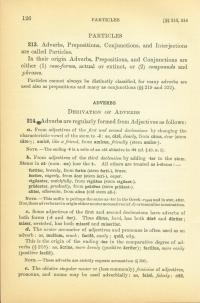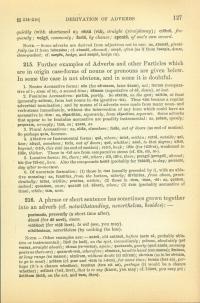214. Adverbs are regularly formed from adjectives as follows.
a. From adjectives of the 1st and 2nd declensions by changing the characteristic vowel of the stem to -ē.
cārē dearly [from cārus dear (cāro-)]
amīcē like a friend [from amīcus friendly (amīco-)]
Note— The ending -ē is a relic of an old ablative in -ēd (cf. § 43, Note 1).
b. From adjectives of the 3rd declension by adding -ter to the stem. Stems in nt- (nom. -nst-). All others are treated as i-stems.
fortiter bravely [from fortis (stem forti-) brave]
ācriter eagerly [from ācer (stem ācri-) eager]
vigilanter watchfully [from vigilāns (stem vigilant-)]
prūdenter prudently [from prūdēns (stem prūdent-)]
aliter otherwise [from alius (old stem ali-)]
Note— This suffix is perhaps the same as -ter in the Greek -τερος and in uter, alter. If so, these adverbs are in origin either neuter accusatives (cf. d.) or masculine nominatives.
c. Some adjectives of the 1st and 2nd declensions have adverbs of both forms (-ē and -ter). Thus dūrus (hard) has both dūrē and dūriter; miser (wretched) has both miserē and miseriter.
d. The neuter accusative of adjectives and pronouns is often used as an adverb.
multum much
facilĕ easily
quid why
This is the origin of the ending -ius in the comparative degree of adverbs (§ 218).
ācrius more keenly (positive ācriter)
facilius more easily (positive facilĕ)
Note— These adverbs are strictly cognate accusatives (§ 390).
e. The neuter ablative singular or (less commonly) feminine of adjectives, pronouns, and nouns may be used adverbially
falsō falsely
citŏ quickly (with shortened o)
rēctā (viā) straight (straightway)
crēbrē; frequently
volgō commonly
fortĕ by chance
spontĕ of one's own accord
Note— Some adverbs are derived from adjectives not in use.
abundē plentifully (as if from †abundus; cf. abundō abound)
saepĕ often (as if from †saepis dense, close-packed; cf. saepēs hedge, and saepiō hedge in).
215. Further examples of adverbs and other particles which are in origin case forms of nouns or pronouns are given below. In some the case is not obvious, and in some it is doubtful.
1. Neuter Accusative forms.
nōn (for nē-oinom, later ūnum) not
iterum (comparative of i- stem of is) a second time
dēmum (superlative of dē down) at last
2. Feminine Accusatives.
partim partly
statim on the spot
saltim at least (generally saltem), from lost nouns in -tis (genitive -tis)
Thus -tim became a regular adverbial termination; and by this means adverbs were made from many noun and verb stems immediately, without the intervention of any form which could have an accusative in -tim.
sēparātim separately from sēparātus separate
Some adverbs that appear to be Feminine Accusative are possibly instrumental.
palam openly
perperam wrongly
tam so
quam as
3. Plural Accusatives.
aliās elsewhere
forās out of doors (as end of motion)
So perhaps quia because
4. Ablative or Instrumental forms
quā where
intrā within
extrā outside
quī how
aliquī somehow
forīs out of doors
quō whither
adeō to that degree
ultrō beyond
citrō this side (as end of motion)
retrō back
illōc (for †illō-ce) weakened to illūc thither
Those in -trō are from comparative stems (cf. ūls, cis, re-).
5. Locative forms.
ibi there
ubi where
illī, illī-c there
peregrī (peregrē) abroad
hīc (for †hī-ce) here
Also the compounds hodiē (probably for †hōdiē) today; perendiē day after tomorrow.
6. Of uncertain formation.
a. Those in -tus (usually preceded by i), with an ablative meaning.
funditus from the bottom, utterly
dīvīnitus from above, providentially
intus within
penitus within
b. Those in -dem, -dam, -dō.
quidem indeed
quondam once
quandō (cf. dōnec) when
c. Those in dum (probably accusative of time) while; iam now
216. A phrase or short sentence has sometimes grown together into an adverb (cf. notwithstanding, nevertheless, besides).
postmodo presently (a short time after)
dēnuō (for dē novō) anew
vidēlicet (for vidē licet) to wit (see, you may)
nihilōminus nevertheless (by nothing the less)
Note— Other examples are:
anteā [old antideā] before (ante eā, probably ablative or instrumental)
īlicō (in locō) on the spot, immediately
prōrsus absolutely (prō vorsus straight ahead)
rūrsus (re-vorsus) again
quotannīs yearly (quot annīs as many years as there are)
quam-ob-rem wherefore
cōminus (con manus) hand to hand
ēminus (ex manus) at long range
nīmīrum (nī mīrum) without doubt
ob-viam (as in īre obviam to go to meet)
prīdem (cf. prae and -dem in i-dem) for some time
forsan (fors an) perhaps (it's a chance whether)
forsitan (fors sit an) perhaps (it would be a chance whether)
scīlicet (†scī, licet) that is to say (know, you may; cf. ī-licet you may go)
āctūtum (āctū on the act, and tum then)


